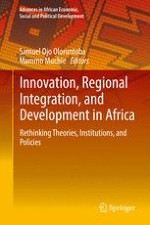2019 | OriginalPaper | Buchkapitel
Analysis of Agricultural Innovation and Decision Making among Maize Farming Household in Nigeria: A Gender Approach
verfasst von : Opeyemi E. Ayinde, Tahirou Abdoulaye, Mammo Muchie, Oluwafemi O. Ajewole
Erschienen in: Innovation, Regional Integration, and Development in Africa
Verlag: Springer International Publishing
Aktivieren Sie unsere intelligente Suche, um passende Fachinhalte oder Patente zu finden.
Wählen Sie Textabschnitte aus um mit Künstlicher Intelligenz passenden Patente zu finden. powered by
Markieren Sie Textabschnitte, um KI-gestützt weitere passende Inhalte zu finden. powered by
